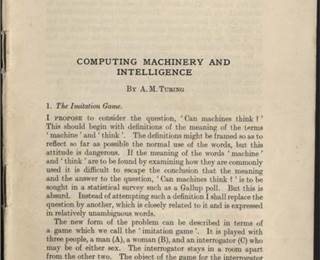The Real Reason Machines Won’t Take Over
You’ll see the sentiment expressed in many of our AI Week articles, in other content at DMN, and even in AI-forward books like What To Do When Machines Do Everything.
The human touch will still be needed. For marketing; for business in general.
And that’s correct. There’s no doing without humans, not just for the immediate future, but possibly not at all. It’s easy to agree with that, but in fact, there’s a very specific reason machines can’t do what humans can do, and it’s worth exploring what it is.
 It all goes back to Turing
It all goes back to Turing
Alan Turing was the towering genius of computer science; he was less adept at philosophy, even though his famous 1950 paper, “Computing Machinery and Intelligence,” was published in a leading philosophical journal, Mind. If you’re familiar with the “imitation game,” now better known as the Turing Test, skip the next paragraph. I’ll see you further down the page.
Turing claimed that intelligence could reasonably be ascribed to any machine which could pass the following test. The machine and a human being, hidden behind a screen, provide answers to questions put by another human being who doesn’t know if h/she is addressing a person or a robot. If the questioner can’t distinguish the machine from the human, then the machine can be credited with (artificial) intelligence. As many have pointed out, having a human and a robot providing competing answers is unnecessary. A simpler version of the test would just put a robot behind the screen, and certify it as smart as soon as it was able to fool people.
The test, however, obscures a deeper philosophical problem, and one which holds the key to the question whether machines can ever be called “intelligent,” in the human sense, at all. Take away the screen. Sit face to face with another human being; pose questions; listen to the answers; and ask yourself, “Why do I unhesitatingly ascribe intelligence to the human being?” In other words, it’s the age-old problem of whether other minds exist, or whether the people we deal with every day are, in effect, flesh-and-blood machines, quite unconsciously producing intelligible speech and behavior.
We can’t address the problem of whether machines can be intelligent unless we first have a good idea of why we ascribe intelligence to our fellow citizens. When we do.
read more/source: http://www.dmnews.com/dataanalytics/the-real-reason-machines-wont-take-over/article/752919/